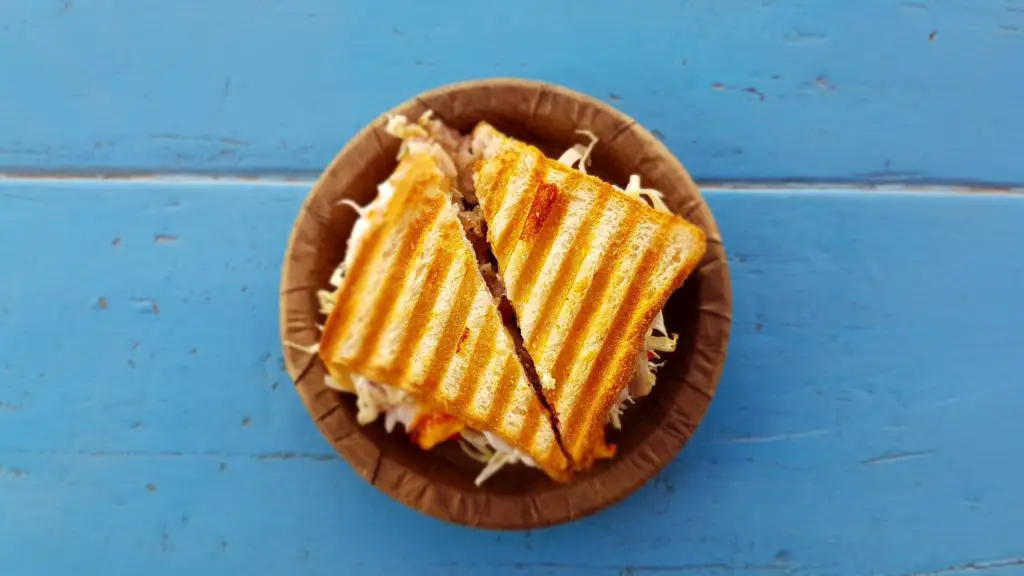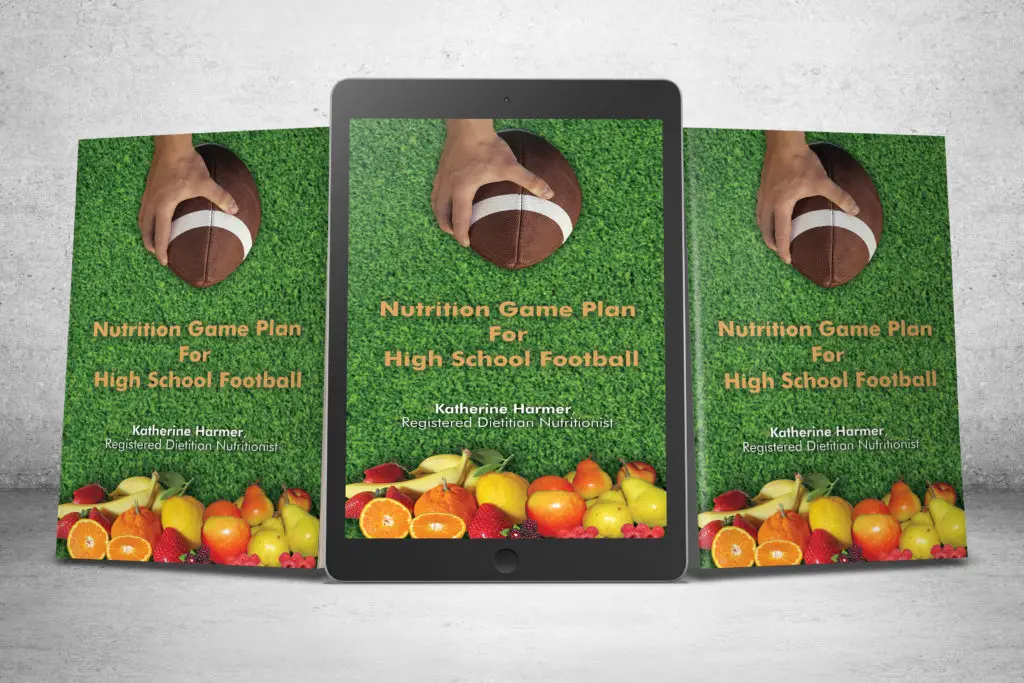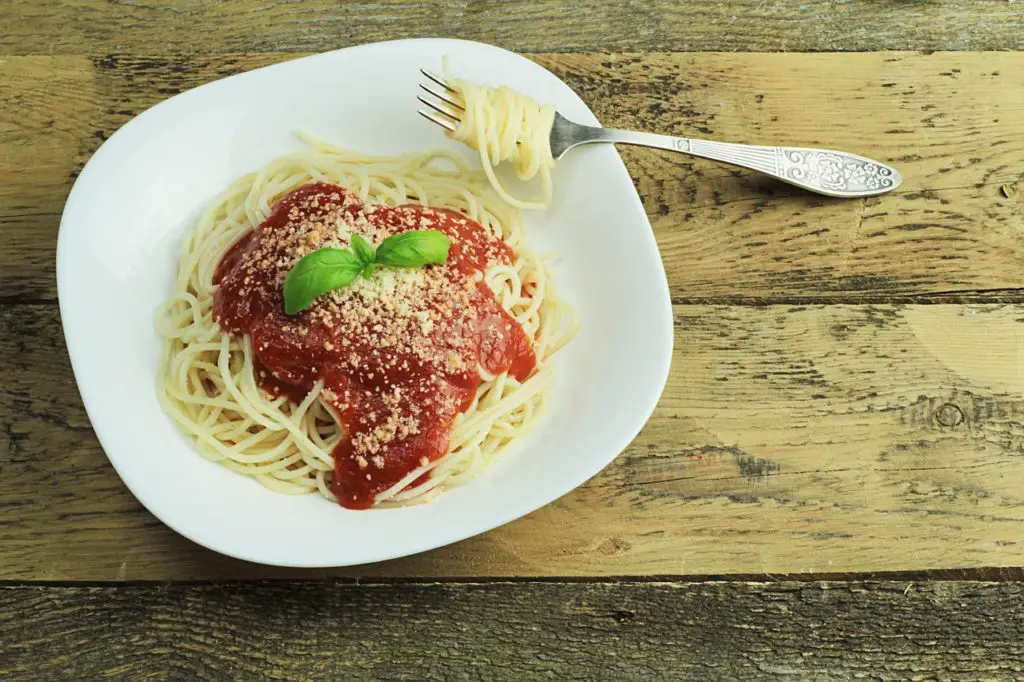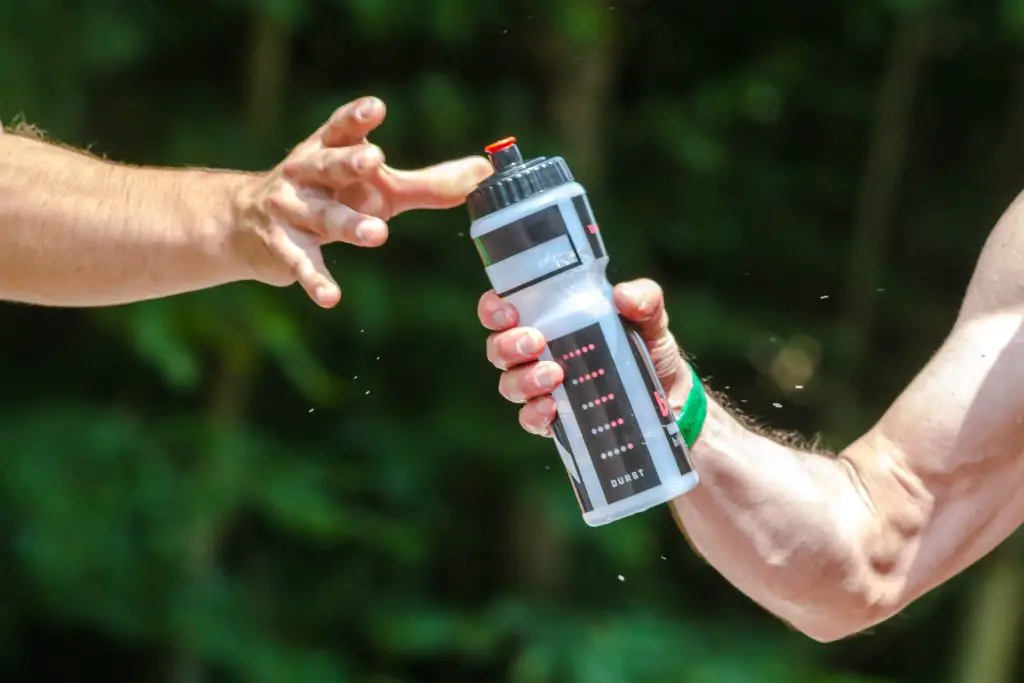You want to start a football game with the greatest amount of energy stored in order to play at your top potential for the longest amount of time. That means you need to plan out your meals and snacks the day of your football game.
Yes, you need to eat something a few hours before a football game. Football athletes should always eat within a few hours before a football game to store energy to fuel their muscles during a high-intensity game. The best pre-game meals focus on a balance of nutrients, are high in carbohydrates, and contain protein.
Keep reading to see when you should eat and what you should eat before a football game.

Looking for a little more help and guidance with nutrition this football season? I’ve got you covered-
Fueling Teens Nutrition Game Plan for High School Football Ebook

All you need to know for a healthy football season! Including a 28-day meal plan, snack idea list, tips for what, when, and how much to eat for football, game-day tips, plus more. Fuel up for your best football season yet and rise above the competition!
Click here for more information.
How Long Before a Football Game Should I Eat?
Eating the right foods and right amounts is key for a football player to maintain the highest energy levels during a football game to play at their top potential.
The timing of your pre-game meals and snacks is important. Plan your food so that you are eating close enough to game time to have a maximum amount of stored energy, but not too soon before the game that you end up playing football on a full stomach. It takes some practice to see what works for you individually to find the best pre-game meal window.
In general, a high school football athlete should eat between 1-4 hours before a football game. Do a trial run on days you have football practice and see how you feel and how you perform after your pre-workout meal. It’s best to eat a little too early, because you can always add a quick snack before kickoff for some additional fuel.
Many players find they do best with a pre-game meal about 2 hours before the game. Do some trial runs before your practices to see what works best for you individually without upsetting your stomach. Start by eating your pre-workout meal 3 hours before football and then add a small snack 30 minutes to 1 hour before. Adjust as needed to fuel your game.
What Should I Eat An Hour Before Football?
Many athletes prefer their pre-workout meal about 1-2 hours before football. If you prefer to eat 3-4 hours before the game, you might find that a snack about 1 hour before kickoff is appropriate to help you feel energized through the game.
Right before football you’ll want to focus on eating some carbohydrates, moderate amounts of protein, and making sure you are properly hydrated.
The best foods to eat right before football include bananas, grapes, dried fruit, toast, crackers, a granola bar, or trail mix. You can add a moderate amount of protein such as Greek yogurt, milk, hard boiled eggs, string cheese, etc. Go easy on the fiber and fat, you don’t want digestion issues on the playing field.
What Should I Eat Before Football Conditioning?
Whether it is an intense day of training or a football game, you need to properly prepare a nutrition plan to fuel your activity. Be smart about your meals and snacks during the day and the timing of when you eat.
To fuel your football game, you should focus on 2 key nutrients for your pre-game meals and snacks- carbs and protein, as well as some other vitamins and minerals, and of course water.
What to Include in a Pre- Workout Meal or Snack:
Carbohydrates
Carbohydrates (or sugar) is the main form of energy your body likes to use to fuel your muscles during exercise. The good news about carbs is that your body can store them (in limited amounts) for use throughout the day.
You want to start a football game with your levels topped off and ready to provide energy for as long as possible during a vigorous football game. You want your muscles to have as much stored energy as possible.
Carbohydrates are natural sugars found in foods such as starchy vegetables, fruit, dairy products, and grains.
Some good pre-game choices for carbs are starchy carbohydrates such as pasta, bagels, potatoes, fruit, bread, rice, corn, cereal, oatmeal, tortillas, etc. These forms of carbohydrates are digested at an appropriate rate to provide you with a consistent energy source over the next few hours.

You need to continually refill your carbohydrate stores throughout the day before, during, and after a football game. A sports drink or small amount of carbs may be appropriate during your football game when you are exerting yourself super hard in order to replenish your body’s carbohydrate stores.
Protein
While protein only contributes a small amount of energy during your game, you need protein because it helps repair your muscle tissue. You need a moderate amount of protein in a pre-game meal, but save your high-protein shakes and bars for after the game.
What are appropriate pre-game protein foods? Choose lean proteins like chicken breast, ground turkey, tuna fish, or peanut butter, Greek yogurt, a protein bar, etc. Consume around 15-30 grams of protein at each meal and snack during the day.
Vitamins and Minerals
Athletes need other nutrients for an overall healthy body with proper function during a football game. You don’t need expensive fancy supplements to be healthy. If you choose an overall balanced diet with plenty of fruits and vegetables, lean proteins, healthy fats, low-fat dairy products, and whole grains you’ll be able to provide your body with an appropriate balance and variety of all the nutrients it needs.

Water
Don’t forget to properly hydrate yourself before a football game. Drink plenty of water throughout the day and during your sporting event. While juices and sports drinks can help, water is best for hydration.
Check out my post Should Football Players drink Gatorade? for other tips when sports drinks might be appropriate.
Some foods can negatively impact your playing ability and cause you to fatigue early, experience stomach pain and cramping, or otherwise hurt your athletic ability. Be sure to check out my post on What NOT to Eat Before Football for a list of some foods to stay away from in order to keep you playing at the top of your ability.
What Should I Eat the Morning of a Football Game?
Another popular question is about breakfast before a football game. Make your breakfast meal high in carbohydrates, lean proteins, water, and go easy on the fat.
Plan your breakfast around healthy carbohydrates. Choose a whole-grain cereal such as oatmeal and pair it with a glass of juice, banana, and toast. If you have a hard time consuming a big meal for breakfast, choose a fruit smoothie instead.
Here are some other appropriate breakfast options for a football player:
- Oatmeal, juice, and toast
- Greek yogurt, fruit, and granola
- Whole wheat cereal, fruit, and milk
- Eggs, pancakes, and milk
- A high-carb smoothie
- Hard-boiled eggs and toast with nut butter
- Bagel with nut butter and yogurt
- Avocado toast with egg
Summary | TL;DR
- Football athletes should always eat within 1-4 hours before a football game to make sure they have enough stored energy to fuel their muscles.
- The best pre-game meals focus on carbohydrates, a moderate amount of protein, healthy vitamins and minerals, and water.
- Experiment to find the best pre-game meal timing that works for you so you aren’t playing on a full stomach, but you have enough energy to fuel your game.
- Enjoy these tips and want more information on how to fuel your best football season yet? Check out my ebook- Nutrition Game Plan for High School Football. All the tips you need in one place including a 28-day meal plan, snack ideas, meal schedule, supplement recommendations, hydration tips, what/when/how much to eat, and more!
Related Posts:
- FREE Meal Plan for High School Football
- Should Football Players Drink Gatorade?
- What Should Football Players Eat After A Football Game?
- The Best Time to Eat Pasta Before Football
- The Worst Foods to Eat Before Football
- How Many Calories Does a High School Football Player Need?
- How Big Should High School Football Players Be?
Fueling Teens is a participant in the Amazon Services LLC Associates Program, an affiliate advertising program designed to provide a means for sites to earn advertising fees by advertising and linking to Amazon.com. We also participate in other affiliate programs which compensate us for referring traffic.
